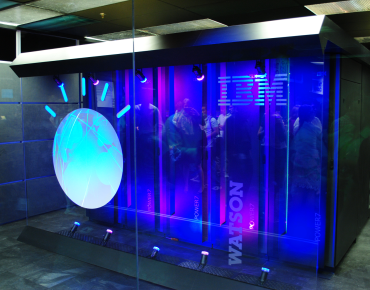IBM Combines Watson With IoT

IBM said it would seek to combine its Watson cognitive computing technology with the emerging Internet of Things (IoT) as another way to boost its cloud platform. The company also announced it would establish a new Watson IoT hub in Germany that will among other things oversee a new effort to deliver Watson APIs on the IBM cloud.
IBM (NYSE: IBM) said Tuesday (Dec. 15) it would establish a Watson IoT center in Munich, noting the initiative represents its largest investment in Europe in two decades. The company also said it was creating eight "IoT client experience centers" in the U.S., Asia, Europe and Latin America.
The Munich hub would serve as a laboratory for data scientists and programmers who will focus on blending cognitive computing with the billions of connected devices and sensor expected to make up the emerging IoT. About 1,000 developers and researchers are expected to work at the research center.
One outcome of the effort will be Watson cognitive computing APIs that will be made available to IoT developers via the IBM Cloud. The focus will be on leveraging Watson technology to cope with growing data volumes and types as sensor data is digitized. The goal is to make these APIs available to chip and device manufacturers via a cloud-based IoT platform as new cognitive IoT applications are developed and tested, the company said.
Watson-based APIs being made available on the cloud cover natural language processing, machine learning, video and image analytics and text analytics, IBM said.
The Watson IoT effort also targets the estimated 90 percent of data forecast to be generated by the IoT that until now is unanalyzed. IBM is positioning Watson as a way for enterprises to "harness this real-time data, compare it with historical data sets and deep reservoirs of accumulated knowledge, and then find unexpected correlations that generate new insights," the company noted in announcing the Watson IoT initiative.
As data volumes grow and the sources of data expand exponentially, IBM also is betting that cognitive computing systems being touted as being able to "learn at scale" will replace traditional programmed computing and analytics platforms. As much as 80 percent of new data swept up by IoT networks will be unstructured data about the physical world. IBM is promoting Watson as a more flexible computing platform for crunching real-time unstructured data.
The Watson IoT hub initiative follows an IBM announcement earlier this year that it would invest more than $3billion on IoT technologies. Along with the Munich IoT research center, the company also said it would establish overseas IoT services centers in Tokyo, Beijing, Boeblingen, Germany, and Sao Paulo, Brazil. U.S. centers will be based on Massachusetts, North Carolina, and Texas.
Related
George Leopold has written about science and technology for more than 30 years, focusing on electronics and aerospace technology. He previously served as executive editor of Electronic Engineering Times. Leopold is the author of "Calculated Risk: The Supersonic Life and Times of Gus Grissom" (Purdue University Press, 2016).











